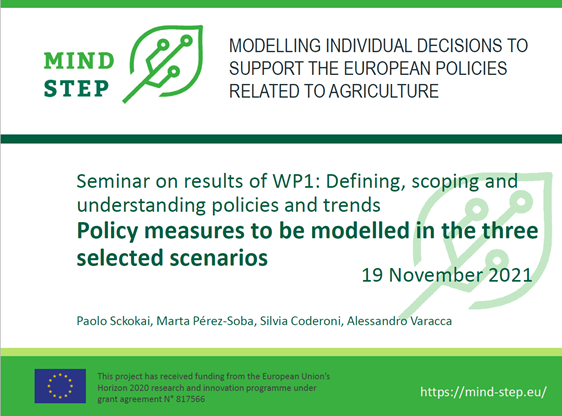On 19 November 2021, the MIND STEP project team attended an online seminar organized by the Università Cattolica del Sacro Cuore (UCSC), Work Package 1 (WP1) leader, where the project results on WP1 were discussed in depth. MIND STEP defines the conceptual framework for the analysis of policies and global drivers affecting the EU farming system, for measuring their impact and for linking them to the corresponding modelling issues. The work carried out in WP1 constitutes the conceptual framework for the whole MIND STEP project, as the whole modelling and policy analysis work will refer to the identified set of policy questions, indicators, and model gaps. In the seminar, guided discussions on modelling exercises and added value of the MIND STEP toolbox were examined and debated.
During the first part of the seminar, the Report on Key policy questions for ex-ante Impact Assessment of EU Agricultural and Rural Policies (Deliverable 1.1) was further explained, consisting of a five-step process, involving different process that involved different research tools and heterogeneous actors (key stakeholders). The major indications brought up by the stakeholders were: the prioritization of environmental issues and the joint analysis of the economy and environmental performance. The Report on Indicator framework for measuring the impact of policies/global drivers on IDM units in agriculture (Deliverable 1.2) and the report on the conceptual framework of the MIND STEP project was reviewed (Deliverable 1.3). Guided discussions (topic 1) took place considering concrete measures for three different scenarios, these scenarios are:
1. Impact of different GHG mitigation measures;
2. Mandatory reduction of input use;
3. Model are coupling of the First Pillar Payments to public
goods and ecosystem services
Discussions on the added value of using MIND STEP toolbox followed, considering the complementarities between individual models with respect to policy questions, as the MIND STEP model toolbox develops linkages between IDM models and current large scale economic models. A MIND STEP General meeting was held after the seminar, taking the opportunity that all the project team attended the morning seminar, and results on the review of the reporting period 1 was the main topic discussed in the project meeting.

